Do Ducks Need a Pond?
Do ducks need a pond? Technically, no, but they do really like ponds! They do need to be able to submerge their heads, and need water for eating and cleaning.
If you want to raise ducks, you do need to consider their water needs. They are called “waterfowl” for a reason. Even duck breeds, like Indian Runner ducks, that are known for their land foraging abilities need and appreciate water.
We'll cover how much water ducks need, why they need it, ways to control the mess, and care tips.
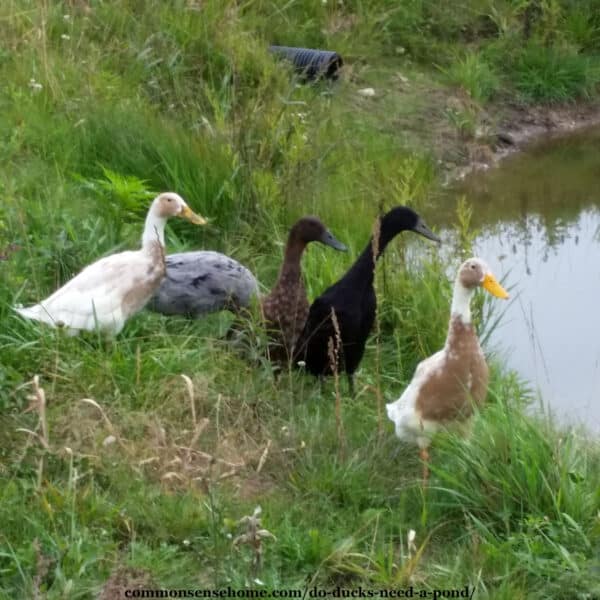
How much water do ducks need?
The minimal amount of water a duck needs is enough to submerge their head. Ducks lack effective tear ducts, so they need water to moisten their eyes. They also use water to clear their nostrils.
It's also important to make sure your ducks have access to clean water every day. We give our small flock one 2 gallon bucket of fresh water in the morning and one at night. If it's muddy, we change the water midday as well.
In winter, they also have a five gallon splash basin. In warmer weather, the ducks have access to two ponds.
Our runner ducks free range during the daytime. We place their water bucket somewhere where we have a good line of sight to it and put the food dishes next to it. It's in the yard near the coop so it's easy for the duckies to find.
When they are inside, we place their water bucket and food containers inside a shallow basin to contain any spills.
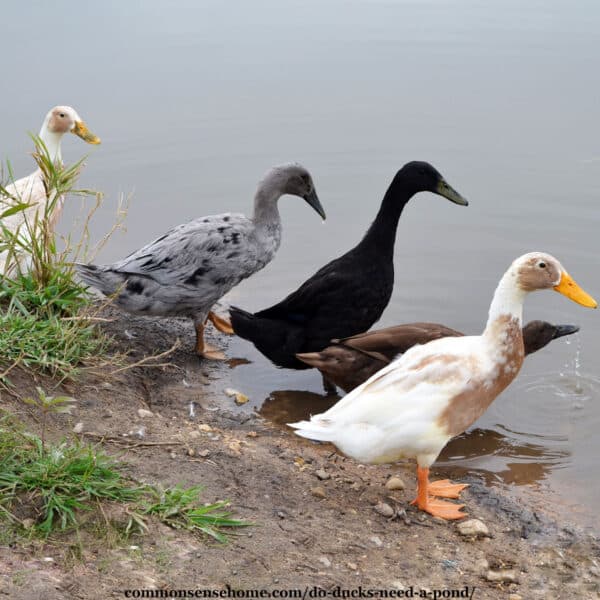
Ducks Need Water for Eating
Regardless of how wet or dry it is outside, we always give our ducks a water bucket with their food.
Some people view letting your ducks have free access to the water bucket as a bad thing stating reasons such as:
- They'll get food in the water and it will breed bad bacteria.
- They'll get it dirty too fast.
- They’ll splash the water out and make the yard muddy.
Ducks like to take a bite of food and wash it down with water. This is a perfectly natural and healthy behavior for ducks.
Some people even go so far as to place wire mesh the ducks can barely reach through in between the ducks and their water bucket in order to keep it “clean”.
Personally, I think using a wire fence to keep your ducks away from water is disturbing. My answers to the problems they state are, “That's why you change the water out, and move the bucket around the yard.”
If you don't have anywhere else to move the bucket to in your yard/run, use the nighttime method of placing the bucket and food dishes in a larger shallow basin to help contain the mess.
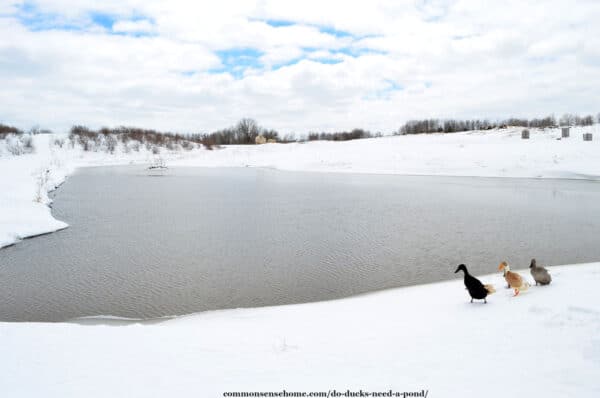
Water for Washing
For optimal flock health, duck keepers need somewhere for your ducks to be able to thoroughly wash themselves. Without enough water access, the ducks' oil glands stop working. Their skin gets dry and their feathers get dull. (More on this below.)
We have two ponds and our duckies love both of them, but not everyone can have a pond. It may not fit in the budget, or you may not have room or the right soil.
Sometimes the best option is something smaller, like a small kiddie pool, or a wide plastic water tub. Whatever you choose, make sure that your ducks have a good way in and out of the water. Sometimes even adult ducks have difficulty getting in and out of deeper pools.
For easy access, we place a large, flat rock on the inside of the basin, and some scrap wood or more rocks to act as a ramp on the outside. It's especially important to have a good ramp for ducklings.
Even if your domesticated ducks have pond access when they're out foraging, that doesn't mean they won't wash in a bucket near the food.
There have been many rainy days when our duckies twiddled and foraged so hard during the day that they came home wet and covered in mud, even though they had more than enough water to wash in outside.
The next day they come barreling out of the coop, their feathers cleaned, oiled, and ready for round two. We find an inch of mud in the bottom of the water bucket.
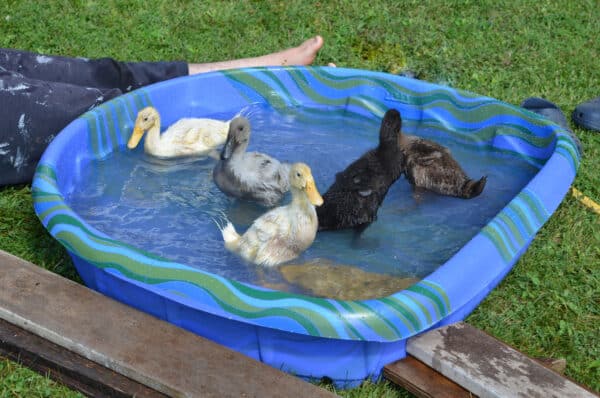
Ducks love time in the water!
There's so many different ways duckies love their ponds and water. They enjoy splashing, diving, dancing, preening, napping, twiddling, swimming, foraging, mating, and more in the water.
I could try to explain why every single one of these things makes them happy but I think just showing you would work better. Here's a video of duckies enjoying water.
Note – if you have a pond, you may attract wild ducks and other waterfowl. We've seen cute little wood ducks, mallards, and mergansers on our pond. They generally get along well with our flock, though occasionally the drakes get into tussles.
Be careful to offer shelter as needed to protect your flock. In our area, we have minks, coyotes and other predators. Thankfully they are mostly nocturnal, though we did lose one duck to an unknown predator.
We always keep the flock in a secure duck house or coop at night. An electric fence may be helpful to keep predators out and ducks in if predator pressure is high.
A cautionary tale as to why ducks need fresh water.
A quick warning – If you don't want to read anything unpleasant right now, just skip to the end of the article.
We were helping a friend butcher chickens one year and had just finished when someone else brought a mixed flock of ducks and geese for butchering. Our friend asked if we would help butcher this next batch of birds and we said sure.
I've never seen birds so sickly and unhealthy as these waterfowl. These birds were so devoid of life they weren't even scared they didn't even try to run or wrestle to get away. They just sat there waiting for it to end.
As they were being butchered we examined them. Their skin was dry and their feathers dull. They hardly had any fat and the fat they did have was white and weirdly greasy. Waterfowl normally have a healthy layer of golden fat.
Their internal organs were discolored and sickly, and they were painfully thin. Even once they were fully cleaned they smelled spoiled.
We found out that their only water source was a little nipple water. They had nothing to submerge their head in. They couldn't clean themselves, and that's why their oil glands never activated.
The only thing they were fed was millet, and they had nowhere to forage and their pen was nothing but bare dirt. These poor ducks had no pond, no proper water, and poor care. “Farm raised” is only as good as the farm care.
I hope this story helps people understand why fresh water and food variety is so important. Whether your ducks are for meat, eggs, or pest control, they need fresh water daily, and enjoy fresh greens and foraging.
See What do Ducks Eat? (and What They Shouldn’t Eat) for more information.
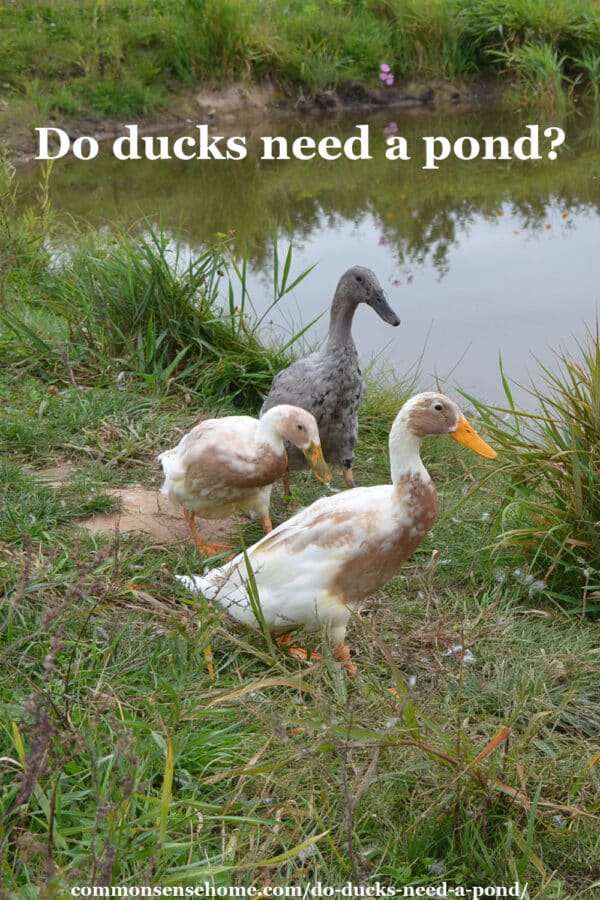
More Tales from the Duck Patrol
We love our small flock of runner ducks. They bring great energy to the yard and gardens, and are a joy to watch.
Duck articles on the site include:
Duckies We Love – And Introduction to the Duck Patrol
Ascites in Ducks – How we Treated Miss Emerald for Water Belly
Duck Pest Control – Working with Ducks in the Garden

This article was written by Duncan Neverman, duck whisperer, kilt wearer, and permaculture enthusiast. Duncan lives with his parents and brother on their multi-generational homestead in northeast Wisconsin. He is looking for the right young woman who shares his passion for healing and healthy environments.

